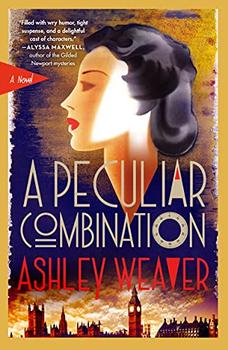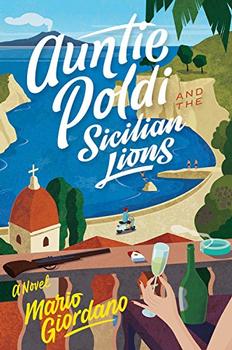Summary | Excerpt | Reviews | Beyond the book | Read-Alikes | Genres & Themes | Author Bio

Lucretia Grindle's latest novel, Villa Triste, is an engaging blend of historical fiction and present day murder mystery. In alternating chapters she provides detailed insight into life during WWII Italy while at the same time drawing her readers into a satisfyingly complex detective procedural.
The opening chapters are narrated by Catarina Commaccio, a young woman on the verge of marrying Lodo, an Italian Navy officer, on September 8, 1943 – the day the King of Italy surrenders to the Allies (see "Beyond the Book"). A nurse, Catarina is an eyewitness to the impact of war on the civilian population of Florence as the Allies and Axis powers fight to control the territory. She is gradually drawn into helping the Italian Partisans in their battle against the Germans and Benito Mussolini's Fascists.
A second storyline is set in modern-day Florence as Inspector Alessandro Pallioti investigates the bizarre murders of octogenarian Resistance heroes. During the course of his inquiry he stumbles on Catarina's diary and begins to see connections between his case and events that took place in decades past.
Both plots are exceptionally entertaining. The parallel stories weave together nicely, and each is intricate and equally engrossing; indeed, I was absorbed by the book from start to finish regardless of which plotline I was following. Grindle's characters, past and present, are also brilliant creations - detailed and full of life, without a flat character to be found anywhere in the novel. The principals almost became real to me, completely maintaining my interest in their lives and actions throughout.
The author's writing really shines, though, in the historical fiction sections; she vividly portrays life in a city gradually being transformed by war:
Winding through the Oltrarno, I passed groups, whole families and little crowds, pulling cars and pushing wheelbarrows laden with God-knows-what. Overnight we had turned into a city of burrowers and hiders – victims of requisition fever. Even Papa had been infected. The night before…he announced that he was having the mechanic come to take the wheels off the car. It would be put up on blocks in the shed. Common wisdom said that if you wished to keep your car at all, this was the only way to do it…Personally I thought the Germans might find an entire city of wheelless cars somewhat suspicious. It also occurred to me that if Lodo was still alive and somehow managed to appear at the appointed time and hour, I would probably have to walk to my wedding.
The author has an unusual point of view regarding Italy's occupiers. At one point she has Catarina write: We told ourselves that most of the German soldiers probably loved this war and Adolf Hitler no more than we did and were just decent men trying to serve their country. She is surprisingly sympathetic to the Germans while condemning both the Italian Fascists and the Allies (whose indiscriminate bombing campaigns killed thousands of Italian civilians).
While interesting, the murder mystery itself contains few surprises; which seems to be Grindle's intent, though, as she provides her readers with ample clues to piece together the "whodunit." The conclusion is nevertheless quite satisfying; one feels justice has been served.
My only complaint about the book is the way Grindle handles dialog, particularly in the sections set in contemporary times. Each character talks in short, choppy sentence fragments almost as if he or she is stammering through the conversation (e.g., "Well, that's not quite true. No and yes. I didn't believe her. I wasn't very pleasant. In fact, rather unpleasant. So I went to apologize."). It's not unreasonable to employ this technique to convey realistic speech, but it's used so frequently, I found it a bit grating by the end of the novel. It's the only flaw, though, in an otherwise stellar composition, and one that's relatively easy to ignore given the novel's many other strengths.
Villa Triste is one of the few books I've encountered recently that at the story's end I immediately started thinking of which reading friends I wanted to share it with – it was a lengthy list. The novel will very likely attract a broad audience, appealing to those who read historical fiction as well as those who simply love a good mystery. Book groups, too, will find this one a good subject for discussion.
![]() This review
first ran in the February 6, 2013
issue of BookBrowse Recommends.
This review
first ran in the February 6, 2013
issue of BookBrowse Recommends.

If you liked Villa Triste, try these:

by Ashley Weaver
Published 2022
The first in the Electra McDonnell series from Edgar-nominated author Ashley Weaver, set in England during World War II, A Peculiar Combination is a delightful mystery filled with spies, murder, romance, and the author's signature wit.

Auntie Poldi and the Sicilian Lions
by Mario Giordano
Published 2019
For fans of A Man Called Ove and the novels of Adriana Trigiani, a charming, delightfully sexy, and bighearted novel starring Auntie Poldi, Sicily's newest amateur sleuth.
Your guide toexceptional books
BookBrowse seeks out and recommends the best in contemporary fiction and nonfiction—books that not only engage and entertain but also deepen our understanding of ourselves and the world around us.